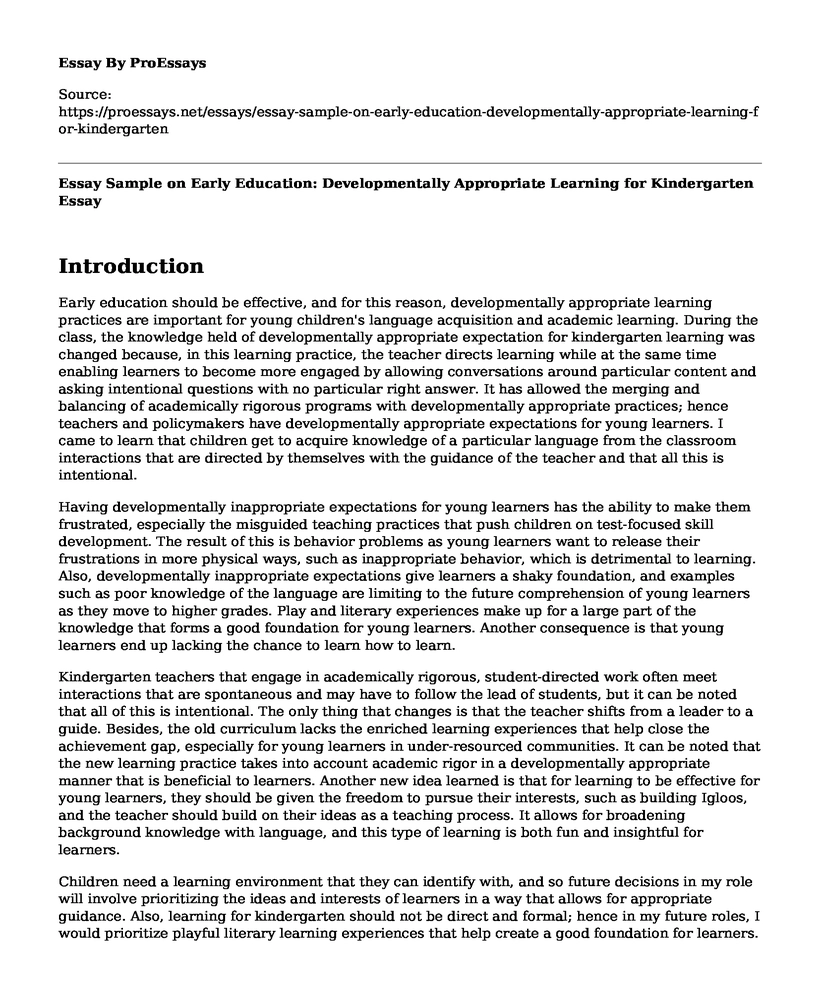Introduction
Early education should be effective, and for this reason, developmentally appropriate learning practices are important for young children's language acquisition and academic learning. During the class, the knowledge held of developmentally appropriate expectation for kindergarten learning was changed because, in this learning practice, the teacher directs learning while at the same time enabling learners to become more engaged by allowing conversations around particular content and asking intentional questions with no particular right answer. It has allowed the merging and balancing of academically rigorous programs with developmentally appropriate practices; hence teachers and policymakers have developmentally appropriate expectations for young learners. I came to learn that children get to acquire knowledge of a particular language from the classroom interactions that are directed by themselves with the guidance of the teacher and that all this is intentional.
Having developmentally inappropriate expectations for young learners has the ability to make them frustrated, especially the misguided teaching practices that push children on test-focused skill development. The result of this is behavior problems as young learners want to release their frustrations in more physical ways, such as inappropriate behavior, which is detrimental to learning. Also, developmentally inappropriate expectations give learners a shaky foundation, and examples such as poor knowledge of the language are limiting to the future comprehension of young learners as they move to higher grades. Play and literary experiences make up for a large part of the knowledge that forms a good foundation for young learners. Another consequence is that young learners end up lacking the chance to learn how to learn.
Kindergarten teachers that engage in academically rigorous, student-directed work often meet interactions that are spontaneous and may have to follow the lead of students, but it can be noted that all of this is intentional. The only thing that changes is that the teacher shifts from a leader to a guide. Besides, the old curriculum lacks the enriched learning experiences that help close the achievement gap, especially for young learners in under-resourced communities. It can be noted that the new learning practice takes into account academic rigor in a developmentally appropriate manner that is beneficial to learners. Another new idea learned is that for learning to be effective for young learners, they should be given the freedom to pursue their interests, such as building Igloos, and the teacher should build on their ideas as a teaching process. It allows for broadening background knowledge with language, and this type of learning is both fun and insightful for learners.
Children need a learning environment that they can identify with, and so future decisions in my role will involve prioritizing the ideas and interests of learners in a way that allows for appropriate guidance. Also, learning for kindergarten should not be direct and formal; hence in my future roles, I would prioritize playful literary learning experiences that help create a good foundation for learners. Technology is an intriguing topic and is related to language acquisition in that computer-assisted language learning can be complementary to the learning practices used during this class. In addition, it is easy for young children to learn second languages, and for this reason, the learning of second languages is an interesting topic related to language acquisition, and young learners would develop from having diverse language skills. Improving technological skills such as the use of digital devices and software has the potential to enhance the understanding of computer-assisted language learning. The advantage is that having technological and computer skills is currently a useful tool for navigating the modern digital world.
References
Riley-Ayers, S., & Figueras-Daniel, A. (2018). Engaging and Enriching: The Key to Developmentally Appropriate Academic Rigor. YC Young Children, 73(2), 52-58.
Cite this page
Essay Sample on Early Education: Developmentally Appropriate Learning for Kindergarten. (2023, Mar 26). Retrieved from https://proessays.net/essays/essay-sample-on-early-education-developmentally-appropriate-learning-for-kindergarten
If you are the original author of this essay and no longer wish to have it published on the ProEssays website, please click below to request its removal:
- Intelligence Tests in Schools Paper Example
- Essay Sample on College Education Necessity: High Tuition Fees a Challenge
- Essay Example on English: The Global Language of Communication
- David Wallace's Captivating Speech to Kenya College Graduates: Daring and Stirring - Essay Sample
- My Dream to Advance My Career: Pursuing an MBA in Marketing - Essay Sample
- Paper Example on Student's Struggle with Vocabulary: What Needs are They Trying to Meet?
- Personal Statement Sample on Management Technology







